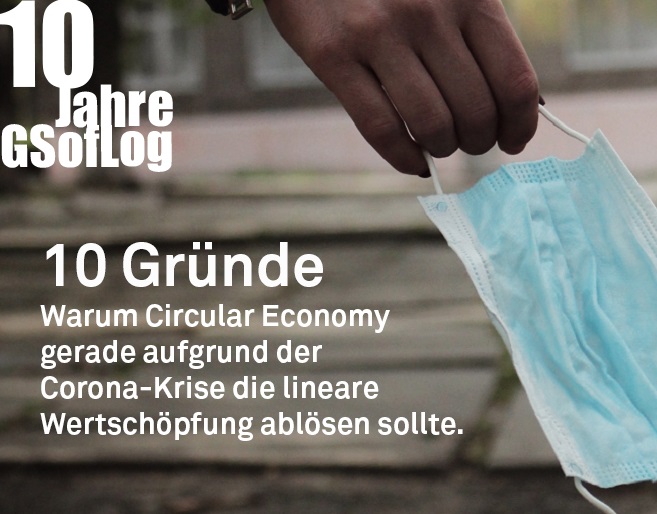TheTen: 10 reasons why Circular Economy should replace linear value creation precisely because of the Corona crisis.
The Corona pandemic and the accompanying economic and social situation have created a changed dynamic that cuts across all industries and social classes. Despite the collapse of entire value chains, as well as numerous restrictions in the professional and private spheres, we should perceive this crisis as an opportunity to learn from it and do better next time – better yet – not let such a situation arise again in the first place. In this article you will learn why a circular economy is the preferred concept during and especially after the Corona crisis.
1. increased waste generation:
The Corona pandemic has a strong impact on waste generation. On the one hand, there is less municipal waste, and on the other hand, there is more medical and packaging waste. Companies have built up excess inventories due to the weakened economy, which they now have to get rid of. As a result, they are increasingly forced to invest in waste management. In some countries, this means generating energy through incineration. But there are also far better, ethical options that allow “waste-ready” products to be reused: Circular Economy.
To ensure that the sustainability successes achieved so far (plastic avoidance, renewable energies, etc.) are not discarded, a circular value creation must be focused on more intensively. Only then will we be able to fully exploit the functionalities of materials and keep the now surplus materials from incineration.
2. used plastics market suffers:
Due to the sharp drop in oil prices, plasticis currently very cheap to produce, making recycling hardly worthwhile and consequently the used plastics market, for example, is suffering. Companies that specialize in recycling and circular value creation should therefore be given special support.
3. decouple resource consumption:
The risk for further pandemics will increase if we do not decouple the still increasing resource consumption from economic growth. This is because, as humans interfere more and more with biodiversity, the likelihood of increased transmission of diseases from animals to humans increases. Because of this, targeted economic stimulus programsshould be implemented for the essential transformation processes in global resource and material extraction.
4. Avoid disposable products:
In the current situation, there is a sudden risk that the trend will move back from reusable to disposableproducts, or from unpackaged to packaged. Of course, this development is not sustainable. However, it also offers innovation potential for new business models that deal with, for example, safe (sterile) exchange of products in order to restore confidence in reusable packaging.
5.Digitization push:
The Corona crisis has triggered adigitalization push in almost all sectors of the economy. Digital technologies can be a key driver for establishing circular value networks, from product design to recycling technologies to communication and platform technologies for end-to-end transparency in circular value processes.
6.Establish local circularity:
The Corona pandemic exposed the side effects and risks of globalizationand how fragile linear value chains are. For example, entire export industries have come to a standstill in our globalized economy.
The longer value chains become and the more stakeholders they contain, the greater the risk of failure. Especially now, when local products are increasingly in demand, there is a great opportunity to establish a circular economy with short and local cycles. And there are already plenty of local circular solutions. For example, alcohol has been extracted from beer no longer consumed in restaurants to make disinfectant. Other companies have converted their resources and use of raw materials to make medical protective equipment. These examples illustrate the diversity of resources that drive our economy.
7. A trend of rethinking:
Global constraints have greatly changed everyday life in both business and personal life. Positive impacts on the environment became immediately apparent and people are becoming more mindful of sustainability. This is a unique opportunity to test and, if possible, maintainresource-conserving lifestyles and practices in industry and everyday life, even after the Corona pandemic.
8. prevent crises:
The sustainability goals also apply during the Corona crisis and should be focused on at this time in particular. After all, just as the “New Deal” was a reaction to the Great Depression of the late 1920s, the “Green New Deal” is intended to bring about an ecological turnaround in industrial society that is environmentally compatible, economically viable and socially responsible. A Circular Economy provides the fuel for this turnaround by increasingly replacing linear value chains with circular value chains so that crises on this scale can be prevented in the future.
9. Securing prosperity:
A high level of innovative strength and competitiveness is the backbone of every industrial nation. However, in order to continue to secure our prosperity, the planned medium- and long-term assistance measures for the economy would not only have to trigger cyclical stimuli, but would have to contribute to our common goal: a climate-neutral as well as resilient economy and society whose prosperity does not depend on the consumption of finite resources.
10. initiate transition:
COVID-19 has greatly elevated the importance of personal well-being, perhaps even above that of economic growth. The pandemic has revealed the inefficiencies of our take-make-waste economy. On May 31, 2020, the crew of the SpaceX rocket docked with the International Space Station (ISS), from where we can see very clearly the limits of our planet. In order for us and future generations to still have something of this planet, it may be time to rethink our economic model and finally begin the transition to a local and circular economy on a large scale.
We have a change of thinking and action in our own hands. We can draw opportunities from the current crisis. The current chaos enables rapid transformation and we are all affected by it. Now it’s time to do!
Our Expert:

Denis Daus
Lehrstuhl für Unternehmenslogistik LFO
TU Dortmund
